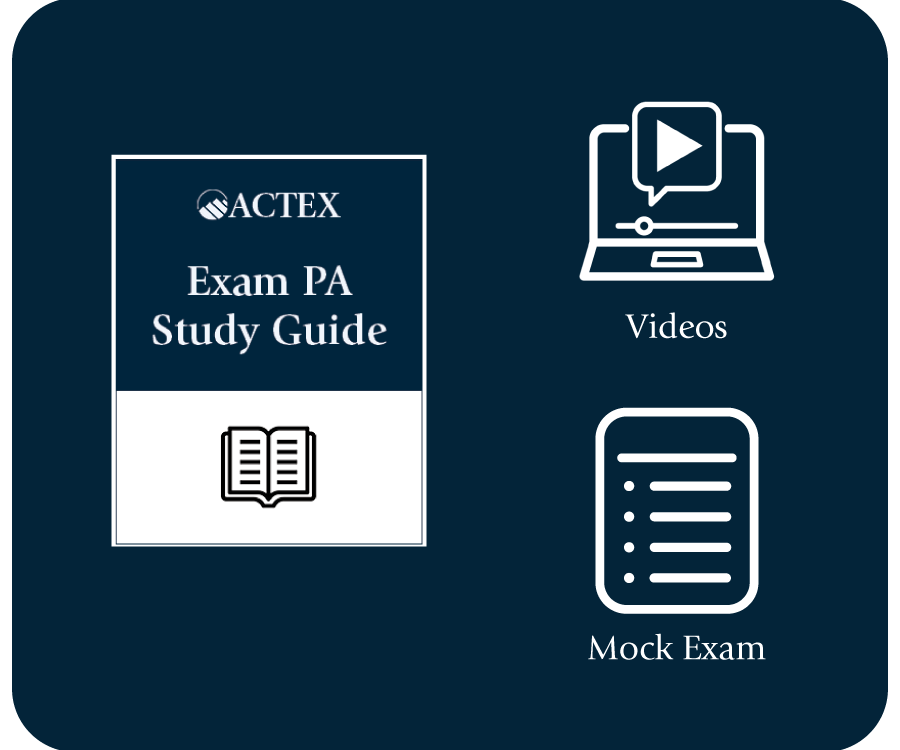Availability
In-Stock | Graded Mock Exam on Pre-order | Print start shipping 2nd week of JanuaryISBN
Digital: 6 month license - 979-8-89016-541-1 Digital: 12 month license - 979-8-89016-542-8 Printed + Digital: 6 month license - 979-8-89016-543-5 Printed + Digital: 12 month license - 979-8-89016-544-2Currency
All prices shown in USDDigital Terms
Click here to view our digital terms.A new product will be added to your cart each time you click the Product button. If additional options exist (checkboxes) to further customize your product and you'd like to choose one of the them, please select the option before clicking the product button to add to your cart. Click here to edit your cart.
PA Study Manual and More!
Begin preparing for the SOA Predictive Analytics (PA) exam with a first-class study manual written by a predictive analytics expert. Designed to support both conceptual understanding and hands-on application, this comprehensive guide helps you build exam-ready skills on a schedule that works for you.
Now enhanced with integrated GOAL questions and Flashcards, included exclusively with the PA Study Manual to support multiple learning styles and reinforce key concepts throughout your study process.


The Exam PA Study Materials include:
- 1,100+ pages of comprehensive, exam-focused content with full syllabus coverage
- 100+ in-text exercises integrated throughout the manual
- 7 full practice exams
- 2 original exams
- 5 past SOA exams
- Integrated GOAL questions to reinforce learning and test understanding as you study
- Over 140 exam-style questions, including practice exams
- Digital Flashcards for efficient review of key concepts
- 114 conceptual review questions available in flashcard format
- Detailed commentary on 8 past SOA PA exams (June 2019–present)
- Downloadable datasets and R Markdown files used throughout the manual
Instructional Videos
Retain more information with our helpful videos that cover key topics in the syllabus. Designed to help you understand the most complex topics and add substantial value to your learning.
We've got you covered with:
- Over 60 instructional videos (covering the core material of Chapters 1-6 of the manual)
- Over 610 hours of video content that walk you through fundamental concepts in PA and the construction of predictive models in R step by step
- Visuals to bring extra value to your learning
- Strong emphasis on key test items in Exam PA
- Now with closed captions in both English and Spanish to make learning more accessible!

Graded Mock Exam
Rehearse before the real exam! Practice with the ACTEX PA Graded Mock Exam - a great way to predict your exam outcome! Before you take the official PA exam - take the ACTEX PA Graded Mock Exam and get feedback from PA expert, Ambrose Lo.
Ambrose Lo, PA professor and author of the ACTEX PA study manual, has designed the graded mock exam to mirror the SOA Exam PA. This Mock exam has all the typical elements your SOA exam will have plus the questions and format are set up just like the SOA PA exam. This allows you to gain insights into the content, format and your strengths and weaknesses prior to taking the exam.
He will lead a team of experts, including Prof. David Lee, PhD and Boxiang Wang, Ph.D. to grade the submitted mock exams.
How does it work?
- You will receive the ACTEX PA Graded Mock Exam by late February
- The Mock Exam will come in a Word Document with spaces for you to input your responses
- Take the exam in the allotted time so you can simulate the 3.5 hours that will be given at the actual exam
- Submit the exam directly to the PA grading team via email.
- Last submission date: March 31st
- Prof. Lo and his team will review, grade and provide written feedback within 2 weeks
1:1 Live Feedback Session on Graded Mock Exam
Want more? Add 1:1 Live Feedback Session to your graded exam. Connect with one of the expert graders and go over your Graded Mock Exam results. You will:
- Get personalized attention: The professor will focus on your areas of weakness and provide guidance that is relevant to your learning style.
- Identify knowledge gaps: Help you determine what to focus on prior to the exam
The instructor that grades your paper is the instructor that you will meet- so they will already have a good grasp of your strengths and more importantly weaknesses! See bios of the teaching team below.

Formula and Review Sheet
This at-a-glance tool helps you memorize and recall key formulas and information.
- Covers important formulas needed to prepare you for the actuarial probability exam
- Easy-to-print reference guide you can study with, no matter where you are
About the Authors
Ambrose Lo Ph.D., FSA, CERA
Ambrose Lo, PhD, FSA, CERA, is the author of several study manuals for professional actuarial examinations and an Adjunct Associate Professor at the Department of Statistics and Actuarial Science, the University of Hong Kong (HKU). He earned his BS in Actuarial Science (first class honors) and PhD in Actuarial Science from HKU in 2010 and 2014, respectively, and attained his Fellowship of the Society of Actuaries (FSA) in 2013. He joined the Department of Statistics and Actuarial Science, the University of Iowa (UI) as Assistant Professor of Actuarial Science in August 2014, and was promoted to Associate Professor with tenure in July 2019. His research interests lie in dependence structures, quantitative risk management as well as optimal (re)insurance. His research papers have been published in top-tier actuarial journals, such as ASTIN Bulletin: The Journal of the International Actuarial Association, Insurance: Mathematics and Economics, and Scandinavian Actuarial Journal. He left the UI and returned to Hong Kong in July 2023.
Besides dedicating himself to actuarial research, Ambrose attaches equal (if not more!) importance to teaching and education, through which he nurtures the next generation of actuaries and serves the actuarial profession. He has taught courses on a wide range of actuarial science topics, such as financial derivatives, mathematics of finance, life contingencies, and statistics for risk modeling. He is the (co)author of the ACTEX Study Manuals for Exams ATPA, MAS-I, MAS-II, PA, and SRM, a Study Manual for Exam FAM, and the textbook Derivative Pricing: A Problem-Based Primer (2018) published by Chapman & Hall/CRC Press. Although helping students pass actuarial exams is an important goal of his teaching, inculcating students with a thorough understanding of the subject and logical reasoning is always his top priority. In recognition of his outstanding teaching, Ambrose has received a number of awards and honors ever since he was a graduate student, including the 2012 Excellent Teaching Assistant Award from the Faculty of Science, HKU, public recognition in the Daily Iowan as a faculty member "making a positive difference in students' lives during their time at UI" for nine years in a row (2016 to 2024), and the 2019-2020 Collegiate Teaching Award from the UI College of Liberal Arts and Sciences.
David Lee, Ph.D., ASA
Dr. David Lee is a Lecturer at the Department of Statistics and Actuarial Science, the University of Hong Kong since 2017 and has taught many actuarial science and statistics courses, such as life contingencies, corporate finance, multivariate statistics, statistical inference and time series. He earned his B.S. in actuarial science (first class honors) and M.Phil. in statistics at the University of Hong Kong, and Ph.D. in statistics at the University of British Columbia. He is a Fellow of the Advance HE, a British professional membership scheme promoting excellence in higher education. He obtained the ASA credential after SOA's curriculum change in 2018, and had first-hand experience in some of the newer SOA exams such as PA and LTAM (getting grade 10 in both).
Boxiang Wang, Ph.D.
Dr. Boxiang Wang is an Associate Professor with tenure in the Department of Statistics and Actuarial Science at The University of Iowa. He received his Ph.D. in Statistics from the University of Minnesota in 2018 under the supervision of Professor Hui Zou. His primary research interests lie at the intersection of statistics, machine learning, actuarial science, and optimization. His areas of expertise within machine learning are wide-ranging and include random forests, support vector machines, cluster analysis, lasso-penalized regression and classification, and model assessment including cross-validation, among others. He has published numerous papers in top journals in statistics and machine learning, including the Journal of the American Statistical Association, the Journal of the Royal Statistical Society Series B, and the Journal of Machine Learning Research, Neural Information Processing Systems. Dr. Wang is also engaged in leveraging machine learning methodologies for solving real-world insurance problems. In addition, as a valuable contributor to the R community, he has developed and released over ten R packages, which have collectively amassed over 100,000 downloads on The Comprehensive R Archive Network.
Besides his achievements in scholarly research, Dr. Wang has also distinguished himself as an exceptional educator, teaching a wide range of courses from probability and statistical theory to computing and advanced machine learning topics. His students range from undergraduate scholars to doctoral candidates, with a notable proportion majoring in actuarial science. Dr. Wang is especially good at simplifying complex technical concepts, making them accessible to students with varying backgrounds. His dedication to pedagogy and his outstanding teaching performance have been recognized with the Bernard W Lindgren Teaching Award at the University of Minnesota and the inaugural Departmental Faculty Award for Teaching at the University of Iowa.





I'm very impressed with the manual. I switched to Actex for PA due to the overwhelming public sentiment that it was the best option available, and it delivered. It covered the basics in a clear and easy to understand fashion, and it also made guesses on likely exam questions that hadn't yet happened... and basically the exact thing showed up on the test! Passed in one try, would highly recommend.





The manual is easily the best actuarial mathematics text I have ever seen. The formula sheet is perfectly put together in a manner that can transition you to the style of FSA exams. The videos are easy to understand. It is interesting and occasionally entertaining. Throughout everything: All concepts are explained (simply and clearly) using correct terminology according to the definitions. There is nothing vague, and there are excellent examples of all of it. It isn't too much information either. Thank you Dr. Lo for an outstanding program!





The feedback was very in depth and extremely helpful to me. I failed the practice exam due to not answering the questions in depth enough. I read all the feedback on each of my answers and was able to improve enough to get a 9 on the real exam!





The Mock Exam gave an excellent feel for the real sitting, in both file layout and question format. The feedback from the graders was extremely helpful, and gave me the exact areas I needed to go back and focus on before taking the real thing. The graded mock exam is a big part of why I was able to pass on my first attempt!





I appreciated the deadline of the mock exam as it was incentive for me to finish studying earlier. I felt like the questions were representative of a real PA exam. Prof’s feedback was clear, understandable and very helpful.





The graded mock exam was the best thing I used to prepare for PA. It was the one thing that made me feel confident as it wasn’t me grading myself. It was extremely useful and the solutions were easy to follow and the comments or suggestions were easy to implement and understand the reasoning!





I think that this product was SO HELPFUL in preparing for the exam. I really appreciated sitting down with a professor and his willingness to answer all my questions. He was VERY knowledgeable


 IFoA Core Readings
IFoA Core Readings